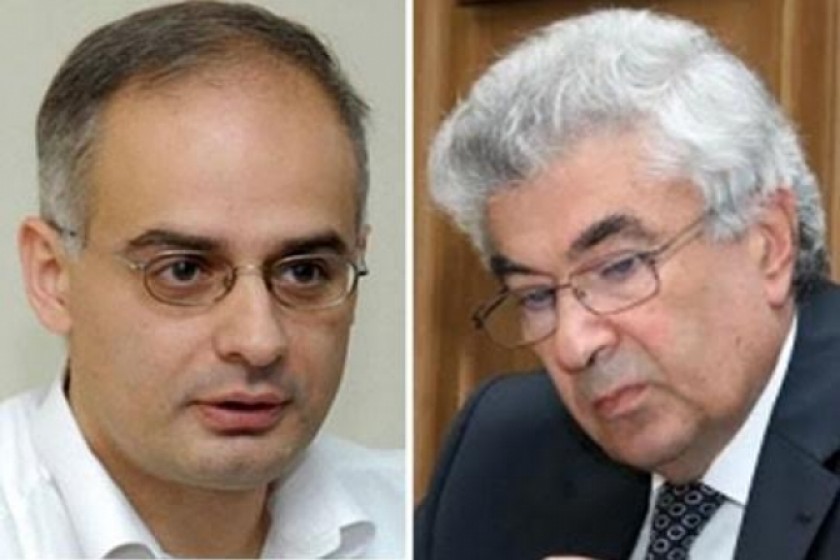
The Same Show: Making Legal and Moral Unaccountability Commonplace in Armenia
Yesterday, Armenia's Prosecutor General’s Office officially rejected a petition filed by HAK (Armenian National Congress) parliamentary faction head Levon Zurabyan to launch a criminal case into whether or not Gagik Harutyunyan, President of Armenia’s Constitutional Court, had bribed the Venice Commission into adopting a favorable position on a bill that would make radical changes to Armenia’s constitution.
Zurabyan, in an October 9 press briefing, said that he had evidence that Harutyunyan, who also heads the committee to implement the changes, had bribed the Venice Commission.
On October 12, the Prosecutor General’s Office (PGO) forwarded new reports on Zurabyan’s claims to the Police Department’s Organized Crime Division. Later, it was learnt that the police returned the material to the PGO. Such a move would indicate that the case will go nowhere.
The PGO argued that no evidence backing up Zurabyan’s allegations had come to light when the material was being initially prepared. The PGO, at the same time, noted that Zurabyan’s statement was not the result of a conspiracy to make intentionally false claims and that the statement was of no real threat to the public.
In reality, what was conveniently overlooked is the fact that the police were unwillingly, or incapable, of following up on the evidence of bribery that Zurabyan said he possessed.
At issue is that Zurabyan not only never went to the police in person, but that he failed to provide any evidence to sustain his statement. Instead of trying to obtain such evidence, the PGO, referring to some investigation of some material, concluded that: “Zurabyan is not avoiding responsibility, rather he merely followed the process of constitutional change, the president of the constitutional change committee, and the members of the Venice Commission to discredit them.”
In order that this absurdity is better understood, let us make a comparison. Imagine that at issue isn’t a charge of giving a bribe but rather attempted murder. It turns out that the PGO, taking no steps to obtain evidence, can evaluate a declaration of information regarding the murder attempt as merely a measure to discredit the potential victim of the murder. On the other hand, what investigation could the PGO have taken to conclude that no bribery had taken place and that Zurabyan was not involved in providing false witness, when the only material at hand were the press reports regarding Zurabyan’s statements. Perhaps, only the Police and the PGO can answer this riddle.
In reality, the PGO simply used it imagination to conceal the fact that a political decision was taken not to pursue an investigation of Zurabyan’s allegations.
However absurd, this situation reveals that law enforcement is a partisan server of higher ups and that unaccountability and lack of value of speech are fundamental characteristics of political culture in Armenia.
The PGO, rejecting any criminal conspiracy underlying the allegations of Zurabyan solely on subjective evaluations, solely paints Zurabyan as a slanderer and maligner. If Zurabyan fails to defend himself by either publishing evidence to back up his claims or, at least, providing such evidence to the police, directly or indirectly, publicly declares that he has lied and has slandered both Harutyunyan and the Venice Commission.
After displaying such behavior, can Zurabyan hope that any citizen will take his future statements seriously? But this isn’t just a matter of confidence regarding Zurabyan, the individual, or his pronouncements.
This is, first and foremost, a question of confidence regarding the opposition in Armenia. The public has built up a particular immunity regarding the constant barrage of irresponsible statements and measures of both small and large officials representing the regime. Now, in fact, they are forcing the public to build up immunity towards that section of the political arena whose political capital is based directly on public support.
After such behavior, can Zurabyan have the moral right to criticize the regime and law enforcement for its inaction, for deceiving and confusing the public?
Two other facts of this story are the most tragic. First, that the name of the president of the Constitutional Court is being smeared. This is an institution that is impossible not to associate with an entity as the primary guarantor of justice.
After Zurabyan’s statement, Gagik Harutyunyan noted that given this situation law enforcement must take immediate measures. Now, law enforcement openly says that they do not want to initiate any steps, which means that Zurabyan’s allegations and charges are left in the air.
So what will Harutyunyan now do to defend his name? If he views the matter to be closed, isn’t he indirectly implying that bribery did in fact take place and that Zurabyan’s suspicions are credible? Will he sacrifice his authority and dignity in the name of partisanship?
Will the inactivity of Zurabyan and the PGO unite in such a way, finally convincing the public that this is the political culture of Armenia, that there is no salvation from the all-encompassing quagmire, and that a parliamentary mandate has finally turned into a free pass for all to work without any degree of accountability?
The second tragic reality is that Zurabyan’s statement elicited no one serious reaction from the public – not regarding the inaction of the PGO or the bribery charges against the president of the Constitutional Court.
Everything is so normal and common that no one is any longer amazed by such things, let alone angered.
It’s just the next show, with the next group of showmen who will, in turn, be replaced by others.
Top photo: Levon Zurabyan, Gagik Harutyunyan
 Videos
Videos Photos
Photos




Write a comment